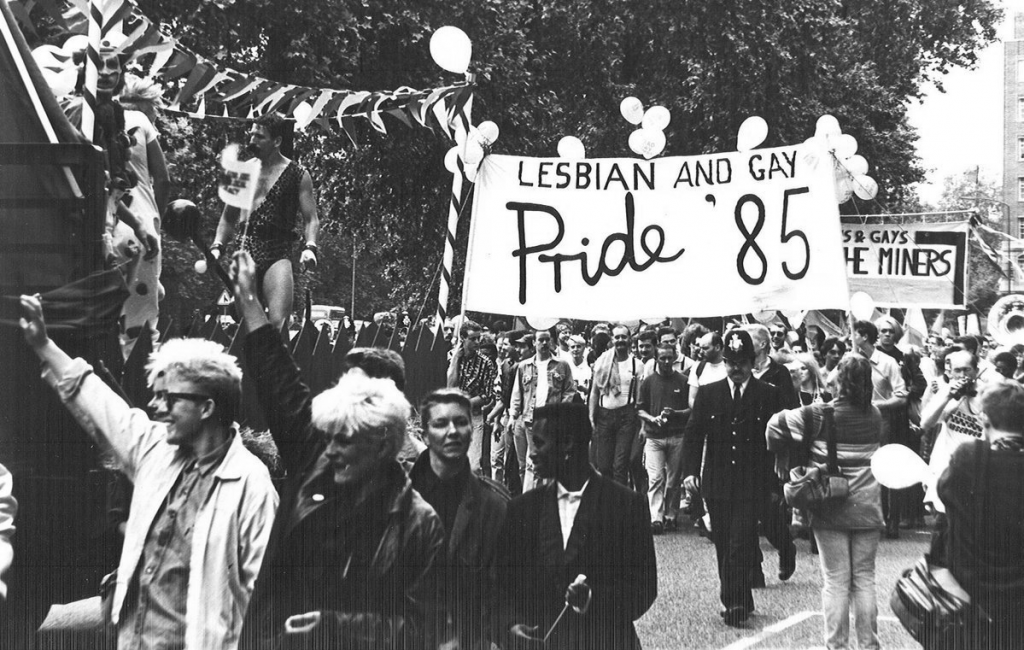Over the last few days most of us in the UK have been celebrating Pride openly online, with marches and events not taking place as usual due to current lockdown conditions. So with this in mind it’s now more important than ever that we reflect on the significance of Pride, what it means to march, and the history of the marches which have come before. One of which in 1985 London stands out significantly and needs to be forever remembered.
The first official Pride parade in London had taken place over 10 years earlier, but what made the 1985 one so important was that it was led by South Welsh Coalminers and their families, who were there to extend their hands in solidarity to a community which had supported them greatly. The year before had seen the National Union of Mineworkers on strike under threat of job losses and closures from the Conservative government under Thatcher. This meant that there were thousands upon thousands of families needing to be fed, clothed, and looked after while the strike was on going. The support was far reaching, but with the Thatcher government actively freezing bank accounts and seizing assets from union organisers, they were in dire need of more and more financial support to maintain the strike.
The police tactics against the striking miners and their picket lines were appalling with thousands of unlawful arrests, many people sustaining injuries on a daily basis, and even a number of them being murdered. It was likely this which exposed the similarities in their situations, as Lesbian & Gay people were far used to sustaining such abuse from the police at their places of social gathering and at any outward expression of their sexuality, and although feeling a momentary relief as it appeared that the police were far more occupied elsewhere, a few understood that this wasn’t a solution.
Mark Ashton, leader of the Young Communist League, and a number of his friends and comrades understood completely that the same government which hated and acted against them also hated and acted against the striking miners. It didn’t matter whether the miners had not previously supported Lesbian & Gay causes, or even if not all of them were innocent of homophobia themselves, because it was a matter of class. So Ashton, alongside Mike Jackson and a number of others, founded LGSM: Lesbians & Gays Support the Miners, an activist group to fundraise and support the mining communities under attack by Thatcher and the police. Soon groups all around the country had formed, and they began to help as much as they could which included helping with food & clothing parcels, and even purchasing vehicles to help transport strikers & supplies around.
They visited one of the mining communities in South Wales, physically extended their hands in friendship and solidarity to support those who were struggling. But it wasn’t long before the newspapers got wind, with The Sun brandishing the headline “PERVERTS SUPPORT THE PITS”, attempting to show how desperate the striking miners were for having to rely on Lesbians & Gays, aka the “perverts”, to support them. But this didn’t stop LGSM one bit, as not long after that they took that headline and put on a huge fundraising concert under the title PITS AND PERVERTS, at the Electric Ballroom in Camden, and featuring Bronski Beat as the headline. One of the miners attending the gig spoke the following to the 1,500 strong crowd:
“You have worn our badge, ‘Coal Not Dole’, and you know what harassment means, as we do. Now we will pin your badge on us, we will support you. It won’t change overnight, but now 140,000 miners know that there are other causes and other platforms. We know about blacks and gays and nuclear disarmament. And we will never be the same!”
This also acknowledged the support which they had received from many people within the Black communities, who also understood too well what it meant to be an oppressed group under attack, with many attending the fundraising event. With all this support, they managed to raise many thousands of pounds to support the miners and their families, and although the strike eventually came to an unsuccessful end, this wasn’t over and it was far from being a wasted endeavour.
For when Gay & Lesbian Pride came to take place in London in 1985 a contingent of South Welsh Coalminers and their families from Blaenant Lodge, alongside thousands who supported LGSM, took the lead. They were the biggest gathering there, and it was the return of an act of support, of friendship, of solidarity. It was one grouping of oppressed people supporting another, because they understood their relationship to each other as a unified working class under oppression and attack of the ruling class. However it didn’t end there. This experience had boosted the commitment of many Trade Unionists and Socialists to supporting gay rights, who later that year at both the Trade Union Congress and the Labour Party Conferences, members of the National Union of Mineworkers block voted to support proposals that gay rights were enshrined in official policy, with many other trade unions following with amendments to their own policies shortly after.
This also equally highlighted the importance of Lesbians & Gays for building alongside and within the working class movement as opposed to in isolation and separately of it. Which is why now, at a time of great civil unrest and hardship around the world, we must turn towards what unifies us as a class. We may know a lot about the history of what has come before us, but we must understand that even though not everything has been victorious, that our greatest victories have come from acting as one. The workers united will never, and can never, be defeated.
Joe Weaver
Further reading:
Pride by Tim Tate
The Red In The Rainbow – Sexuality, Socialism & LGBT Liberation by Hannah Dee



